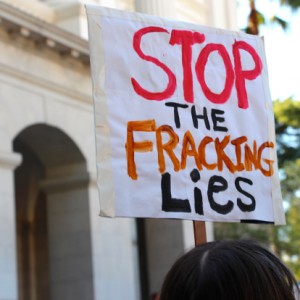 If campaign contributions don’t actually buy the votes of legislators, at least they will get your voice heard when a key issue arises.
If campaign contributions don’t actually buy the votes of legislators, at least they will get your voice heard when a key issue arises.
That’s certainly been the case for the natural gas industry’s recent influence on Harrisburg’s political class. Big energy companies have been key donors throughout Gov. Tom Corbett’s political career. They have contributed over $20 million to influence Pennsylvania legislators on gas exploration issues.
According to the political watchdog group Citizens for Responsibility and Ethics in Washington, “Gov. Corbett turned Pennsylvania’s state government into a favor mill for campaign supporters.”
As a case in point, look at Act 13, passed by state lawmakers in 2012 to amend the Pennsylvania Oil and Gas Act. Back then, some feisty city and county lawmakers had begun to establish zoning regulators to prevent fracking—hydraulic fracturing of shale rock to extract natural gas—from being used within county limits. Act 13 put an end to that, requiring that all Pennsylvania cities must open their zoning laws to allow drilling.
Various communities immediately asked the courts to intervene, and in late December 2013, the Pennsylvania Supreme Court declared Act 13 in violation of the state constitution. The split decision had four justices determining that the law was unconstitutional, two justices saying it was permissible, and one justice who did not participate in the decision.
What comes next for fracking in Pennsylvania?
At Ostroff Godshall Injury and Accident Lawyers, we’re no fans of fracking. Fracking is a dangerous practice that places our natural resources at risk and imperils our citizens.
For the short term, there will be no changes. The zoning rules under Act 13 never went into effect because a court order blocked their implementation. Perhaps a few more counties, cities, and townships will alter their zoning rules to limit new fracking operations. However, we can’t expect a statewide rush to ban the practice.
We also wouldn’t be surprised if the legislature in Harrisburg were to devise a new law to replace Act 13. Consider this. Of the four Pennsylvania Supreme Court justices who voted to reject Act 13, three did so because they believed the Act violated environmental guarantees in the state constitution.
A new zoning law that also included measures to protect natural resources from unbridled fracking might regain the approval of those three justices. That would make a majority of the court in support of centralizing zoning authority at the state level.
Living with fracking for the foreseeable future
No matter what happens to the legal landscape, the Marcellus Shale is still going to be beneath Pennsylvania. The gas beneath the shale represents riches for big energy firms, greedy speculators, and compliant politicians. Despite the threats to health and life from fracking, there’s zero likelihood that the practice will stop. The best we can hope for is closer industry regulation and a chance to call individuals to account when something bad happens.
If a fracking-related truck accident, exposure to toxic chemicals or pipeline explosion hurt you, we can help. You need the advice of an experienced fracking injury lawyer to understand your legal rights.
Call to connect with Philadelphia fracking attorney Jon Ostroff and his team at Ostroff Godshall Injury and Accident Lawyers today. Your FREE and confidential consultation with a lawyer will help you understand what approach is best for your recovery.



 If campaign contributions don’t actually buy the votes of legislators, at least they will get your voice heard when a key issue arises.
If campaign contributions don’t actually buy the votes of legislators, at least they will get your voice heard when a key issue arises.